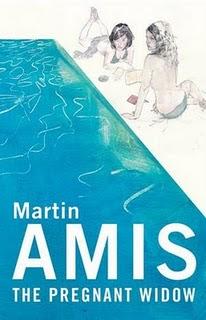The Pregnant Widow

I’m so upset that I’m not at Hay Festival right now. Because the lineup looks phenomenal. Not only is Stephen Fry doing a talk, but Zadie Smith and Martin Amis are both on the lineup. Now, Smith is awesome for all sorts of reasons, and, coincidentally, I actually read White Teeth at Hay Festival last year. But this year I’d be more interested in seeing Amis—which is surprising given that he is a grumpy old man with a penchant for misogyny. Or so the legend goes. He, in fact, denies this claim, and tells us that his book, The Pregnant Widow, is "very feminist"—although he admits it will get him in trouble.
Indeed, it has not been received particularly well from the lovely group of people at BBC 2's The Review Show. Supposedly about the feminist revolution and the destruction that it wreaked on the people who were affected by sexual liberation, I found (as, it seems, did Germaine Greer) that there was an awful lot of focus on body parts. Scheherazade has big tits. Gloria has a big arse. And Keith’s girlfriend Lily has neither. That seems to be all that matters for a lot of the book. Keith’s main mission is to sleep with as many of the girls as possible, and then (spoiler alert) he marries all of them in succession.
The characterisation of the female characters is weak. Scheherazade is a ridiculous appropriation of the "poor little rich girl" stereotype, lifted from a piece of chick lit where marriage is the only goal. (I am aware that comment is derogatory to chick lit and, as I am reading a book about that very subject at the moment, I thus present this long back-covering disclaimer.) Scheherazade is the only woman who ends up happy, because she gets married and has kids, ignoring the sexual liberation movement. Woop. Well done, girl.
Violet, however, Keith’s free-spirited sister, gets destroyed. Killed off because she has too much sex. She is apparently based on Amis’ own sister, Sally, whom he is convinced was killed by her promiscuity, or some other such ridiculous reason. Maybe it had actually nothing to do with feminism, and neither does the demise of Violet, who appears to have mental health issues and is dire need of help. That is why she dies—not because feminists allowed women their sexual agency and made it less (not completely) shameful to have sex as a woman.
Keith is an overly whiny character. He needs to get some courage and just deal with his issues. He always seems to want to blame someone else for his own failings in life—and it’s irritating. He is not a lovable character and, quite honestly, I’m not rooting for him for most of the novel. Or any of it, actually.
Despite all this, and despite Amis’ desire to elevate his own (or Keith’s own, although it’s supposed to be semi-autobiographical) struggle to a higher level by associating it with 1970s feminism, I really enjoyed The Pregnant Widow. The personal is not always political, which I think Amis might need to think about before he tries this sort of thing again, and despite it making me angry every now and again (particularly the pretentiousness of Keith’s character), I liked it.
The Pregnant Widow is evocative, well-written, and clever, and the story is enjoyable. (Although I do feel it tapers out a bit when we get into serious mid-life crisis territory.) It’s not the usual "zOMG look how postmodern I am" offering from Amis, and I really liked it. Maybe even loved it.